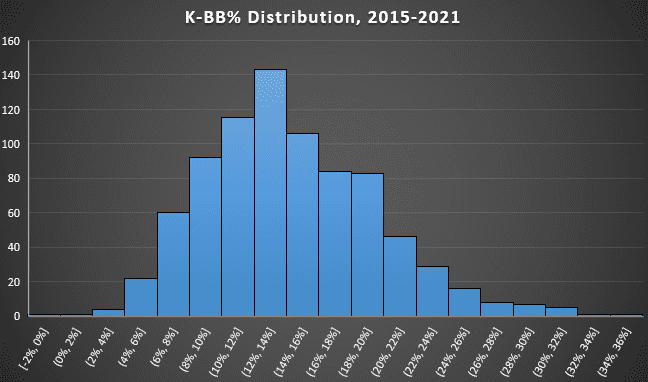Jon Anderson dives into K-BB%, one of the most important pitching statistics, to see which pitchers saw the biggest drop in the 2021 season.
We opened up this two-part series in this post, where we went over the K-BB gainers in 2021. Now, it's time to look at the other side of the coin and some of the most notable fallers.
In the first part, I reviewed why I believe this statistic to be the most important metric to look at when evaluating pitchers. I think it is worthwhile to cover that again, so below I did a copy-paste of what I wrote in that post.
The next section of this article will detail what this metric is, why it is so important to focus on, and what numbers are good and bad in this category.
Be sure to check all of our fantasy baseball lineup tools and resources:- Fantasy baseball trade analyzer
- BvP matchups data (Batter vs. Pitcher)
- PvB matchups data (Pitcher vs. Batter)
- Who should I start? Fantasy baseball comparisons
- Daily MLB starting lineups
- Fantasy baseball closer depth charts
- Fantasy Baseball live scoreboard
- Fantasy baseball injury reports
What It Is
For our purposes, I am using K-BB%. I'll quickly explain what that is for those of you unaware.
K% - Strikeout Rate. The percent of hitters faced that a pitcher strikes out. If a pitcher faces 100 batters and strikes out 30 of them, that's a 30% K%.
BB% - Walk Rate. The percent of hitters faced that a pitcher walks. If a pitcher faces 100 batters and walks eight of them, that would be an 8% BB%.
K-BB% - This is the difference between K% and BB%. The bigger the number, the better.
So what's a good K-BB%? I could answer that simply, but first I'll show you the whole distribution of K-BB% that pitchers throwing 100+ innings in a given season since 2015 have posted.

The average K-BB% for pitchers reaching 100 innings in a year since 2015 is 14.2%. That basically means the average K% was 23% and the average BB% was 9%, a difference of 14 points. A K-BB% between 17% and 20% could be considered good, between 20% and 25% would be considered great, and above 25% is elite. Anything below 10% is bad, with it getting worse and worse as the number moves towards zero (only one pitcher has actually thrown 100 innings with a negative K-BB%, Tyler Chatwood in 2018).
Only 29 pitchers have gone above 25% over a full season since 2015. The names that have accomplished this: Chris Sale (five times), Max Scherzer (six times), Clayton Kershaw (four times), Gerrit Cole (three times), Justin Verlander (twice), Jacob deGrom (twice), Carlos Rodon, Shane Bieber, James Paxton, Jose Fernandez, Mike Clevinger, Robbie Ray, Corey Kluber, and Corbin Burnes.
Why It's Important
I can answer this question with one simple, and yet beautiful, scatter plot. Here is the relationship between K-BB% and ERA:
What you can see here is a very strong relationship between these two metrics. As your K-BB% goes up, your ERA trends downwards, and vice versa. There are very few examples of a pitcher posting an ERA below four while being under 10% in K-BB%.
When you look at the relationship with other statistics such as exit velocity, fly-ball rate, velocity, spin rate, and those kinds of newer statistics and ERA, you just don't see a very strong relationship. K-BB% is a great predictor of ERA, and there aren't many stats you can say that about.
Biggest 2021 Decliners
I went ahead and looked at every pitcher that threw at least 100 innings in 2021 AND at least 50 innings between 2019 and 2020, and compared their K-BB% figures between those two (meaning I just combined 2019 and 2020 together since 2020 was such a short year). Here is the full list of pitchers that saw their K-BB% decline by at least two points in 2021.
Much like last time, it's important for us not to just focus on the "Diff" column here. A pitcher could have posted a strong K-BB% in 2021 but still appear here just because they were even better in 2019-2020. Gerrit Cole is an example here, as you can see his elite 27.8% K-BB% in 2021 still put him on this list because of the super-elite 32.1% mark he posted before that. Let's get into the most interesting names here.
Zack Greinke, Houston Astros - Age may have finally caught up to Greinke, whose numbers all went the wrong way in his age-37 season with the Astros. His 17.2% strikeout rate was one of the worst marks for starters (in fact it was the 13th worst mark for pitchers that made at least 20 starts). His walk rate also got worse, coming up to (a still very good) 5.2% from 3.6% between 2019 and 2020. There are very few paths to success with such a low strikeout rate, so I think it's safe to move Greinke far down your lists for 2022.
Patrick Corbin, Washington Nationals - Corbin's career has torpedoed in a hurry, but a lot of fantasy managers were willing to take the huge discount on him in 2021 hoping for a rebound. That didn't happen, as Corbin posted a minuscule 19% strikeout rate in 2021 while posting an average walk rate of 8%. He pitched a full year and did not pitch well, making him a guy that probably just should not be drafted next season.
Mitch Keller, Pittsburgh Pirates - Keller was a popular breakout pick in 2020 because of the strong 28.6% K% and 7.0% BB% he posted in a short 2019 campaign with the Pirates. Things did not go well for him in 2020, and then they got way worse in 2021. He struck out just 19.6% of the batters he faced in 2021 while walking 10.4% of them, for a pathetic 9.1% K-BB%. These are really discouraging numbers for a guy who was so dominant in the minors, and there are seemingly fewer and fewer reasons for optimism on Keller every year.
Kyle Hendricks, Chicago Cubs - Everybody's favorite soft-tosser, Hendricks has never been a guy to sparkle in the K-BB category, but things got pretty bad for him in 2021. He had just a 16.7% strikeout rate and his walk rate came up a bit, albeit to a still great 5.6%. His end-of-year numbers still weren't that bad, as he used his pinpoint control to once again keep his team in most games he pitched, but for fantasy purposes, Hendricks is not looking very interesting in 2022.
Luis Castillo, Cincinnati Reds - Lots will be said about Castillo this year, who was drafted as a top-12 starter in 2021 and went on to absolutely bomb fantasy teams for the first couple of months before getting to the finish line in pretty darn good shape. His end-of-year strikeout rate was just 24%, about five points lower than expected. A slight silver lining was that he posted a 26% strikeout rate after July 1st with a walk rate under 9%. He has never been a guy to post elite walk rates, but the strikeouts and ground-balls kept him still elite. If he posts another 25% strikeout rate in 2022, he won't be a fantasy ace, but nobody is doubting his upside. All of this said, I don't think many people will draft Castillo as their SP1 next year, and rightly so.
Blake Snell, San Diego Padres - Another weird year for Snell, as he was terrible for the first four months (a 5.44 ERA and a 1.61 WHIP), but then was dominant down the stretch (a 1.83 ERA and a 0.77 WHIP in his last eight starts). In those last eight starts, he posted a 39.4% strikeout rate and an 8.5% walk rate, which really salvaged his numbers for the year. For the year, he posted a 12.4% walk rate, which is just not going to get the job done. The question for 2022 will be what do you expect? There is certainly ace-level upside with Snell, but he's just been so frustratingly inconsistent that it's tough to click that button in drafts.
Zach Plesac, Cleveland Indians - Another popular breakout pick for 2021, Plesac fell flat. His strikeout rate came down to 16.7%, which was not to be saved by his great 5.7% walk rate. It doesn't seem like Plesac has the strikeout ability to stick as a good fantasy option, but at the ripe age of 26 and with the command he has shown, it is certainly much too early to write Plesac off for fantasy purposes moving forward.
Other names to be worried about: Hyun-Jin Ryu, Chris Paddack, Kenta Maeda, Cal Quantrill
More Fantasy Baseball Advice
 RADIO
RADIO
























